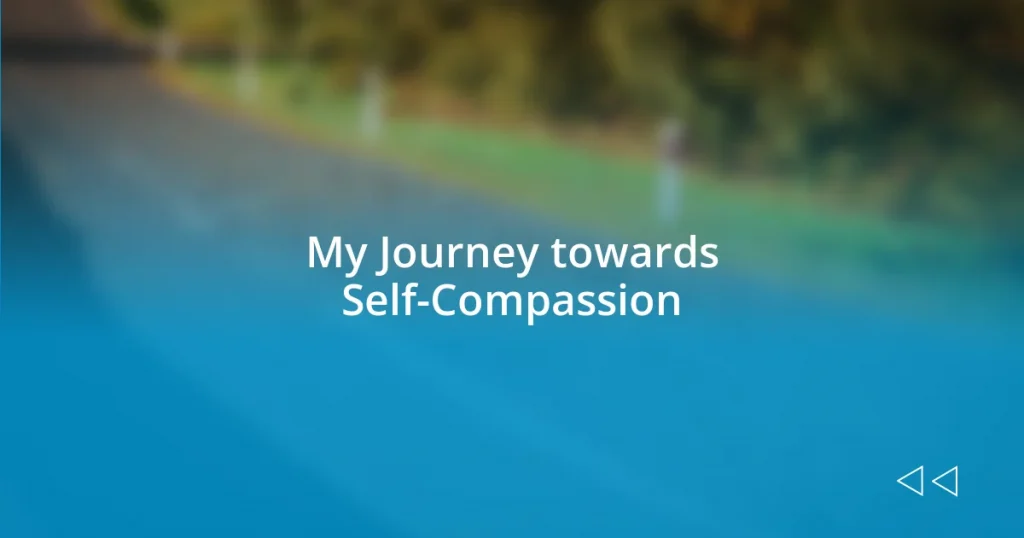Key takeaways:
- Self-compassion fosters growth by creating a safe space for learning, shifting one’s perspective to view flaws as opportunities rather than barriers.
- Incorporating self-growth practices, such as journaling and meditation, enhances emotional clarity and nurtures resilience during challenging times.
- Developing a personal self-compassion ritual, including mindfulness and affirmations, can transform self-critical thoughts into acts of kindness and acceptance.
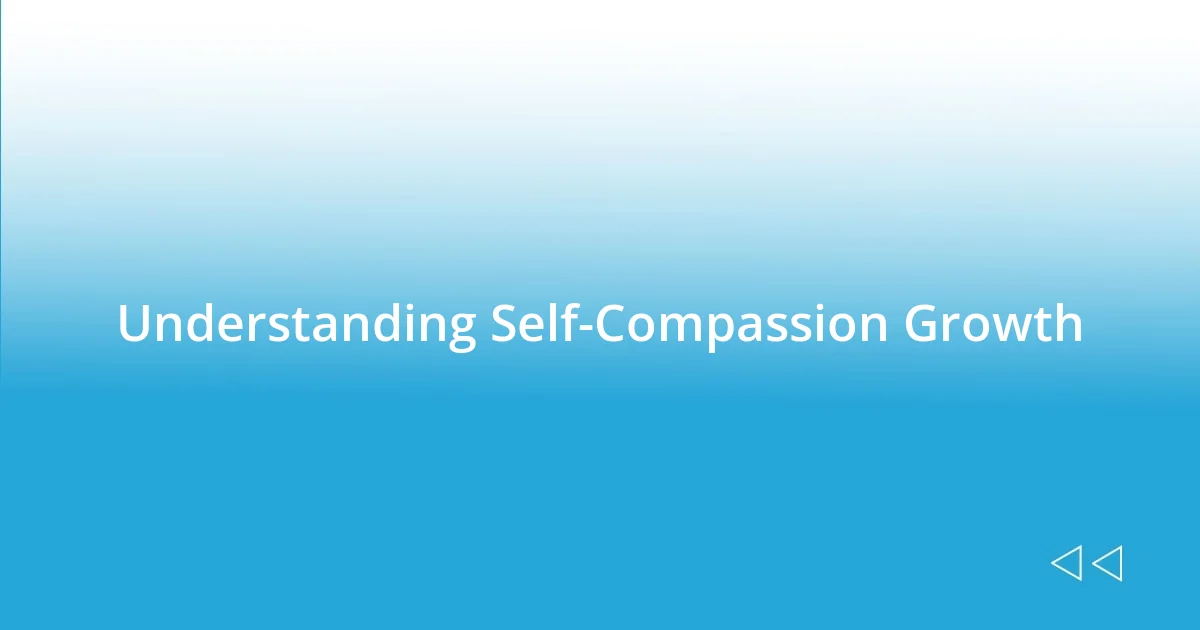
Understanding Self-Compassion Growth
Self-compassion is often misunderstood as self-indulgence, but the truth is quite the opposite. I remember a time when I berated myself for making mistakes, thinking that harshness would push me to improve. But I’ve come to realize that treating myself with kindness allows for growth—the kind of growth that truly matters—because it creates a safe space for learning and healing.
As I explored the concept of self-compassion, I found that it has layers, much like peeling an onion. Each layer revealed new emotions, from guilt to acceptance, forcing me to confront my vulnerabilities. I often ask myself, “What if I approached my flaws with curiosity rather than judgment?” This shift in perspective allowed me to embrace my imperfections and see them as opportunities for growth rather than barriers.
Over time, I learned that self-compassion is not a destination; it’s a journey. Each time I catch myself engaging in negative self-talk, I pause and practice mindfulness. I ask what I would say to a friend in a similar situation, and I often find that my advice to them is much kinder than my thoughts toward myself. Gradually, this practice transformed my inner dialogue and deepened my understanding of self-compassion’s role in fostering resilience.
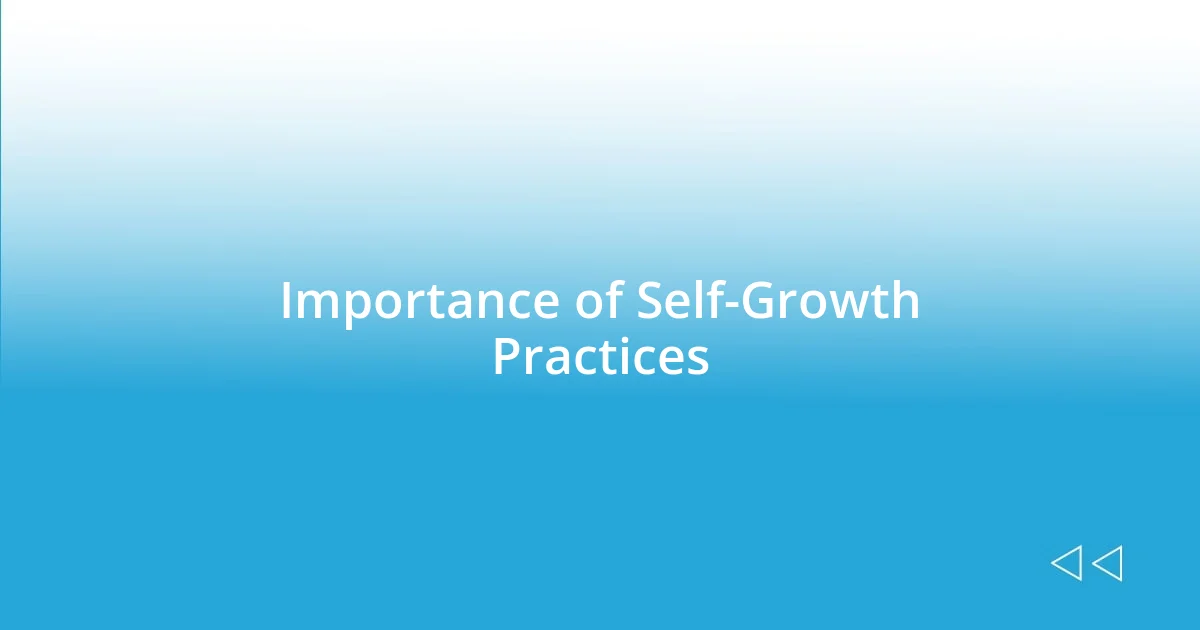
Importance of Self-Growth Practices
Practicing self-growth is a vital part of living a fulfilling life. I once attended a workshop where the facilitator emphasized the importance of reflecting on our experiences. It struck me how much I had overlooked the simple act of journaling. Recording my thoughts allowed me to see my progress over time, which historically had gone unnoticed. I realized that self-growth practices create a foundation for me to build resilience, ultimately helping me become more adaptable to life’s challenges.
I cannot overstate how transformative embracing self-growth practices has been for me. For instance, I set aside time each week for meditation, which has significantly improved my emotional clarity. In moments of stress or self-doubt, I find myself leaning on this practice, reminding me that growth often comes from moments of stillness. This intentional habit has helped me develop a stronger sense of self, allowing me to navigate life’s ups and downs with greater ease.
Engaging in self-growth practices fosters a deeper connection with oneself. I often reflect on a time when I struggled to prioritize my needs, feeling overwhelmed and depleted. However, by incorporating simple habits like reading uplifting literature and engaging with a supportive community, I began to see that prioritizing my emotional health was not selfish. Instead, it became a cornerstone of my journey toward self-compassion, paving the way for healthier relationships and a more profound understanding of my worth.
| Self-Growth Practice | Impact on Self-Compassion |
|---|---|
| Journaling | Helps track progress and recognize personal growth over time. |
| Meditation | Increases emotional clarity and resilience during challenging times. |
| Reading uplifting literature | Encourages prioritization of emotional health, enhancing overall well-being. |
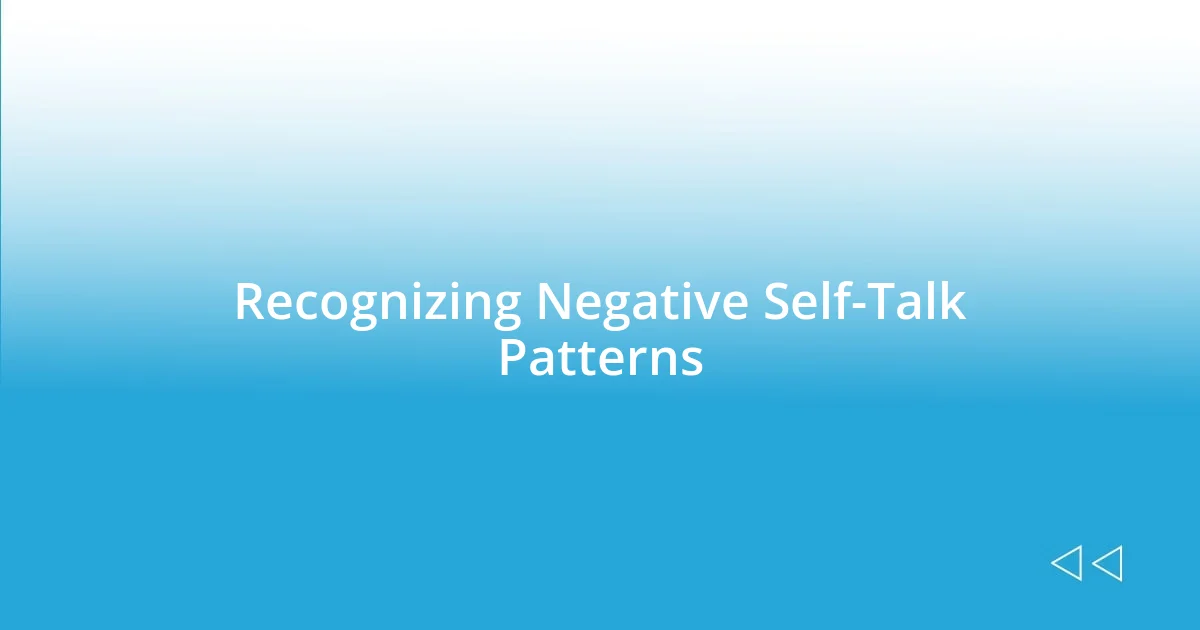
Recognizing Negative Self-Talk Patterns
Recognizing negative self-talk patterns is an essential step in my journey toward self-compassion. I vividly recall times when I would replay my mistakes over and over in my mind, drowning in a sea of self-criticism. These negative thoughts often stemmed from a fear of not being good enough, and I found myself trapped in an unhelpful cycle. Identifying these patterns required honesty and a willingness to reflect on my inner dialogue.
To further illustrate this, here are common negative self-talk patterns I’ve noticed in my own experience:
- Catastrophizing: Imagining the worst-case scenario, even when it’s unlikely.
- Personalization: Blaming myself for things outside my control.
- Overgeneralizing: Taking one negative event and assuming I’ll always fail.
- All-or-Nothing Thinking: Viewing situations in black-and-white; if I’m not perfect, I’ve failed.
- Discounting Positives: Ignoring my successes and only focusing on my shortcomings.
By recognizing these patterns, I began to question my thoughts. Instead of accepting them as truths, I approached them with curiosity. I often asked myself, “Is there a different way to look at this?” This shift wasn’t always easy, but it was liberating. Understanding my negative self-talk patterns has become a powerful tool in fostering kindness toward myself, enabling me to nurture a more compassionate inner voice.
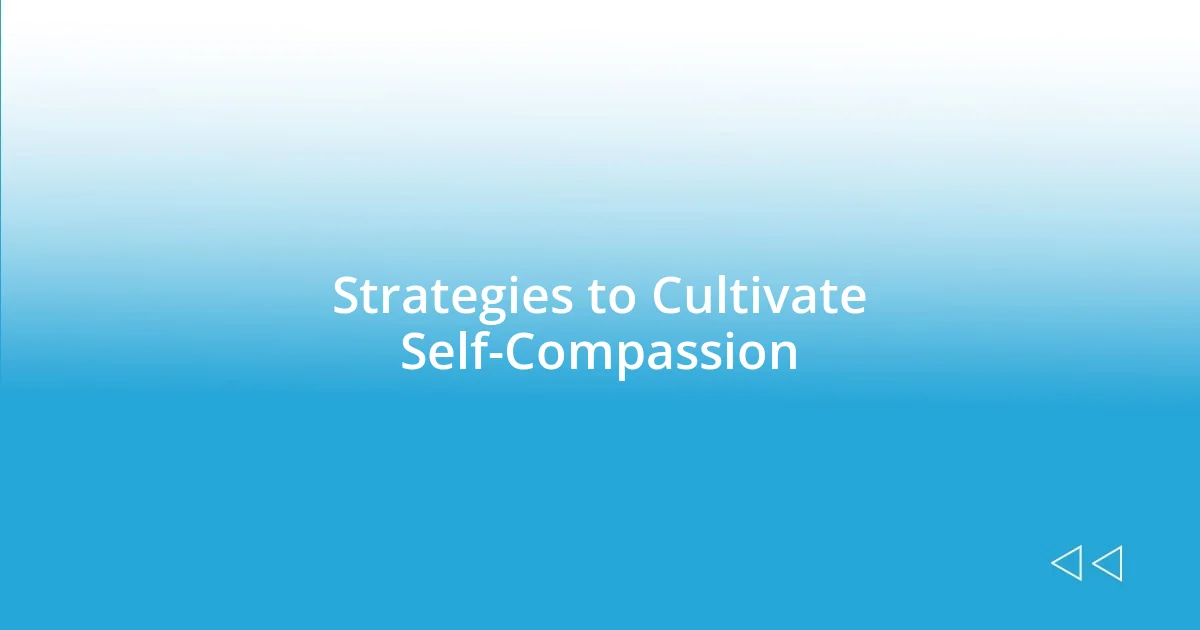
Strategies to Cultivate Self-Compassion
One effective strategy to cultivate self-compassion is to practice self-kindness during difficult moments. I remember a time when I failed to meet a personal goal, and my immediate reaction was to berate myself. However, I decided to pause and say, “What would I tell a friend in this situation?” This simple shift allowed me to treat myself with encouragement instead of criticism. By giving myself permission to be human and imperfect, I started fostering a kinder relationship with myself—one that’s grounded in understanding rather than judgment.
It’s also beneficial to create a self-compassion mantra. I have a phrase I repeat to myself, especially during moments of high stress: “I am enough, just as I am.” This mantra serves as a gentle reminder of my worth, even when I struggle. Have you ever noticed how powerful words can be? For me, saying this out loud shifts my mindset and helps diffuse feelings of inadequacy. I encourage you to find or create a mantra that resonates with you; it can be a game-changer in difficult times.
Finally, I find that connecting with others can reinforce my self-compassion journey. Sharing experiences and vulnerabilities often leads to meaningful conversations and deeper bonds. I recall a candid chat with a friend who faced similar challenges; we both recognized that we were harsher toward ourselves than we would ever be to each other. I realized that opening up and allowing myself to be seen in my struggles not only built my own self-compassion but also fostered an environment of empathy and support. Isn’t it incredible how shared experiences can lighten the weight we carry?
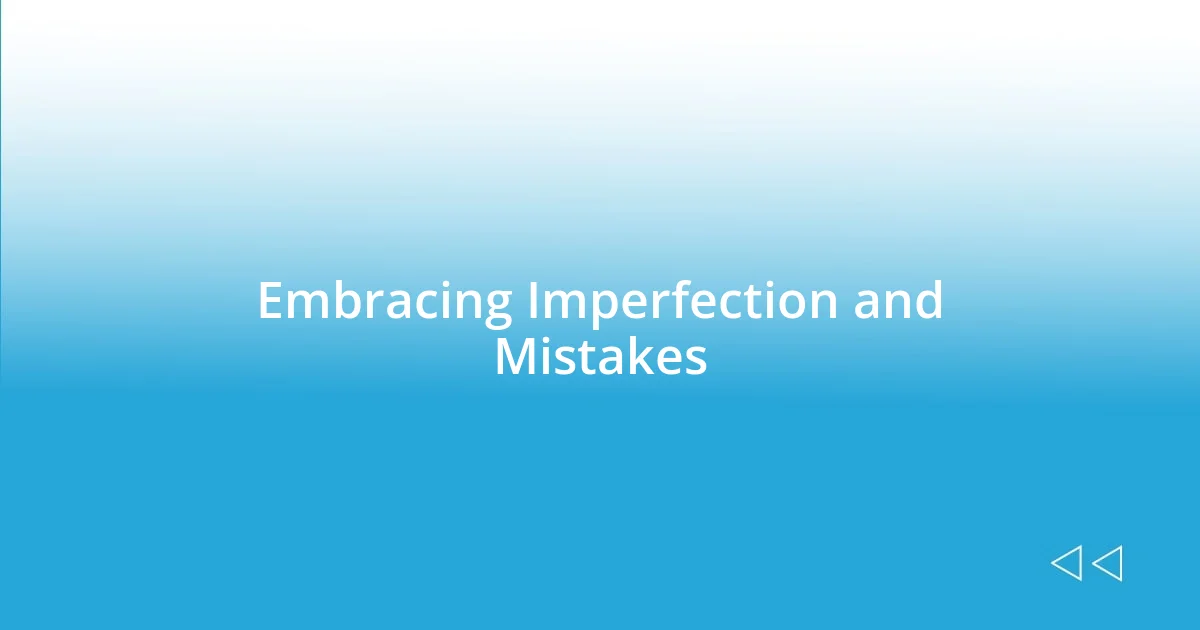
Embracing Imperfection and Mistakes
Embracing my imperfections was a pivotal moment in my journey. I used to hold myself to unrealistic standards, convinced that anything less than flawless was an absolute failure. One day, I stumbled while giving a presentation at work. I felt my face flush with embarrassment, thinking everyone was judging me. But then, I noticed a colleague smiling at me, clearly relating to the struggle of being human. That moment clicked—a realization that everyone makes mistakes.
It’s fascinating how we often see our flaws so magnified. I’ll never forget attempting a new recipe that turned out to be a culinary disaster. Instead of the gourmet dish I envisioned, I ended up with a burnt mess. But instead of sulking, I burst into laughter! I invited friends over and turned it into a fun cooking night. We shared our kitchen blunders, and it was incredibly freeing. Through these experiences, I’ve learned that joy often sprouts from our missteps.
I often ask myself, “What if I viewed mistakes as stepping stones rather than stumbling blocks?” This shift in perspective has transformed my relationship with imperfection. I’ve started to welcome mistakes, viewing them as opportunities to learn and grow. When I think back on my biggest growth moments, they stemmed from times when things didn’t go as planned. Recognizing that imperfection is not only acceptable but human has been liberating—it’s like allowing myself to breathe easier in my own skin. Why would I deny myself that freedom?
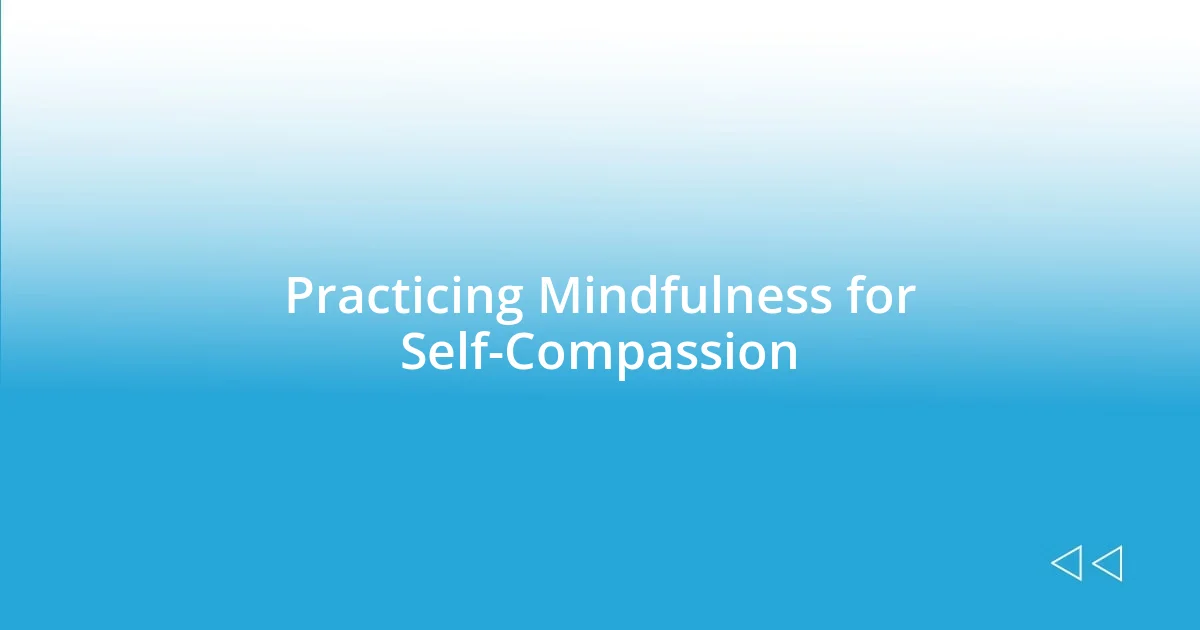
Practicing Mindfulness for Self-Compassion
Practicing mindfulness has profoundly impacted my journey toward self-compassion. I vividly recall sitting in meditation one evening, feeling the weight of my worries flooding my mind. Instead of pushing the thoughts away in frustration, I decided to acknowledge them, reminding myself that it’s okay to feel overwhelmed. This practice taught me that simply being aware of my emotions without judgment can create space for kindness. Have you ever noticed how acknowledging your feelings can lift a burden off your shoulders?
When I’m mindful, I become more attuned to my inner dialogue. I once had a particularly challenging day where I found myself lost in negative thoughts, spiraling down the rabbit hole of self-doubt. It was through mindful breathing that I could pause, reminding myself to treat those thoughts as fleeting clouds rather than my ultimate reality. As I exhaled, I felt that familiar weight start to lift just by recognizing—even for a moment—that these thoughts don’t define me. This awareness is a crucial step toward cultivating a compassionate mindset.
Engaging in mindfulness also means treating myself with the same patience I extend to others. I often remind myself after a tough day: “Just like others deserve understanding, so do I.” For instance, I remember when I mismanaged my time and missed out on an exciting social event. Initially, I was harsh on myself, berating my poor planning. However, I took a moment to breathe deeply and reflect on why I made those choices. In understanding, I could forgive myself and treat that experience as a valuable lesson rather than a mistake—a small but significant act of self-compassion. How can we truly grow if we don’t allow ourselves the grace to learn from our choices?
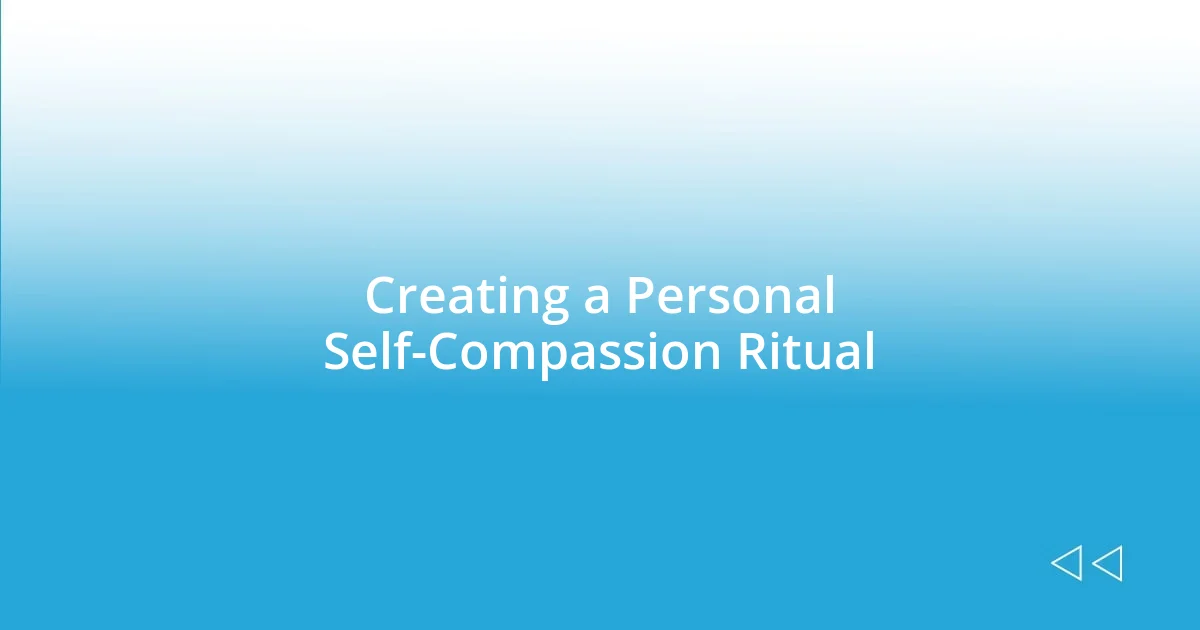
Creating a Personal Self-Compassion Ritual
Creating a personal self-compassion ritual is a powerful way to nurture kindness towards ourselves. I’ve found that establishing a nightly routine has become my lifeline. Before bed, I take a few moments to reflect on my day and jot down any moments where I felt self-critical. It’s like releasing those judgments onto paper, allowing me to confront and then release them. Have you ever tried simply writing down your thoughts? It can be surprisingly cathartic.
Another layer of my ritual includes a warm cup of herbal tea, a little self-soothing with each sip. It’s a comforting act that reminds me to slow down and breathe. I often pair this with gentle affirmations; I’ll look in the mirror and say, “I’m doing my best, and that’s enough.” Although it felt a bit awkward at first, with time, I began to feel the warmth of those words settle deep within. What do you think—could a simple affirmation change your perspective, too?
Recently, I incorporated a mindfulness meditation that focuses on self-forgiveness. Picture this: as I sit in stillness, I visualize a younger version of myself, longing for acceptance. I gently remind her that it’s okay to make mistakes and take a moment to embrace her with warmth. That visual connection stirs up a deeper understanding of my past struggles. Isn’t it amazing how tapping into our past can transform how we treat ourselves in the present? I encourage you to find what resonates with you; a personalized ritual can be transformative.











